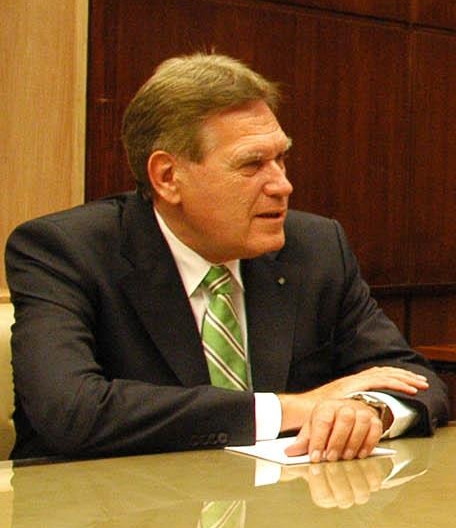It's no good if we go ahead and switch off safe nuclear plants...and increase our energy prices that way.

"Michael Glos" is a Germany/German politician (Christian Social Union in Bavaria/CSU) who served as Federal Ministry of Economics and Technology (Germany)/Minister for Economics and Technology from November 22, 2005, until February 10, 2009.
After the secondary school level, he made an apprenticeship as miller and became master in 1967. Starting 1968, he managed his parents' flour mill in Prichsenstadt.
Since 1970, Glos is a member of the Christian Social Union in Bavaria/CSU. In 1972 he was the first chairman of the CSU-chapter of his hometown Prichsenstadt. From 1975 to 1993, he was chairman of the CSU-district of Kitzingen. Since 1976 he is part of the executive board of the CSU Lower Franconia. Since then he is member of presidency of the CSU Bavaria. From 1993 to 2005, he was chairman of the CSU parliamentary group and deputy chairman of the CDU/CSU/CDU/CSU parliamentary group.
From 1972 to 1978, he was member of the district council of Prichsenstadt and, from 1975 to 1993, member of the council of the district (Kreistag) of Kitzingen. In 1976, Glos was elected to the Bundestag.
Glos is married and father of two children. His third child died in a car accident near Munich in 1997.
More Michael Glos on Wikipedia.Thirty percent of our gas comes from Russia at the moment. That should be increased. But it can only be increased if we know that deliveries from the East are dependable.
The latest developments show how important it is to draw on a balanced, broad energy mix, The German nuclear power plants were doomed by the Red-Green coalition to be switched off only for political reasons.
The latest developments show how important it is to draw on a balanced, broad energy mix.
I am convinced that, internally, Gerhard Schroeder already has stepped back somewhat and is only asking himself how he can sell that to his party and the supporters who trust him.
We need to speed up the approval process with fewer agencies involved, fewer forms to fill out, fewer meetings and fewer rules. That's the only way we're going to free up energies that will lead to the creation of new jobs.
I don't think that the negotiations will fail.
The 17 million German households [which use gas heating] for the moment have no cause for concern. They will not be affected by what has happened so far.
I am optimistic that these talks won't collapse.
Copyright © 2024 Electric Goat Media. All Rights Reserved.